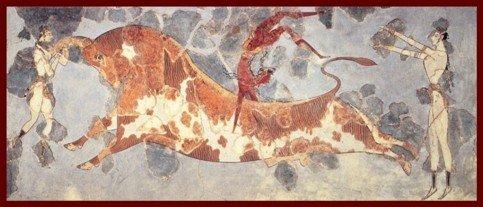|
Mary Renaultby Linda ProudMary Renault (1905 – 1983) was born to parents very unlike herself. Retreating from pressure to be a good little girl who would grow up to have a husband and children, Mary kept company with her books and dreams. Her first love was cowboy stories. A donation of Plato's works to her school library, however, introduced her to this ancient Greek philosopher. Her enthusiasm for Plato drew her to the University of Oxford where one of her tutors was J.R.R. Tolkien. In her second year she lodged with a relative of Sir Arthur Evans, the keeper of the Ashmolean Museum and discoverer of the Minoan Palace of Knossos on Crete. In the museum Mary saw a replica of a fresco showing three acrobats leaping a bull, an image which imprinted itself on her soul and emerged much later as the inspiration for The King Must Die.
Her first stories, however, were hospital romances, the result of working as a nurse at the Radcliffe Infirmary in Oxford, where she met and fell in love with Julie Mullard, who became her lifelong companion. Hospital romances perhaps, but they were steeped in Mary’s Platonism, the idea that earthly love can draw a person to a higher, more mystical love of virtue itself. One of them won a prize rich enough to allow her and Julie to emigrate to South Africa and live a hedonistic life freed of the constraints of postwar Britain. Many of her new friends were gays escaping Britain, where homosexuality was still illegal, but Mary disapproved of their camp and outrageous behaviour. Mindful of the dignity of the homosexual in ancient Greece, she wrote The Charioteer, the first British novel to deal with the theme of homosexual love. Despite its title it was a contemporary novel, but it did establish themes which informed her later work, chief amongst which was the ideal of Platonic love – which is chaste. Recognising that historical novels would give her the opportunity to reflect critically on her own age, Mary changed tack. She had immersed herself in Plato to write The Charioteer and wanted to stay a while longer with her beloved philosopher. It seemed natural – if daunting – to recreate his times. 
Plato’s Dialogues record conversations between his teacher, Socrates, and anyone unwitting enough to present a proposition as a truth. Through rigorous questioning, Socrates invariably left other people’s opinions in tatters. While reading Xenophon’s Life of Socrates, Mary came alive with the classic question behind so many historical novels: what had these other characters of Plato’s Dialogues – Phaedo, Gorgias, Alcibiades and Critias – really been like? The result was The Last of the Wine, published in 1956. Through the eyes of Alexias and his friend Lysias, we witness the dramatic events leading up to the trial and death of Socrates. She wrote the book from research in contemporary sources such as the histories of Thucydides, transforming the facts in the crucible of her imagination: no ordinary imagination, not the kind which pleasantly daydreams and orchestrates conversations between the famous dead, but the kind which time-travels and can experience, as if through the senses, what it is like to be someone else, in another place, another culture, another time. Mary takes us there and we become her characters.
After The Last of the Wine, inspired by a visit to the Palace at Knossos where she saw the original fresco of the bull-leapers, Mary went back to the Minoan age with The King Must Die and its sequel, The Bull from the Sea. Then she returned to the time of Plato. The Mask of Apollo is narrated by an actor in the golden age of the Greek playwrights. She is best known for her last three novels, about Alexander the Great: Fire from Heaven, The Persian Boy, and Funeral Games. My own Platonism, which I explore in The Botticelli Trilogy, is due to Mary Renault. It crept into me unsought and unbidden as I read her novels in the school library. When I came to read the Dialogues myself, they seemed already familiar, and Plato’s theory of a reality behind this one already my philosophy. That is the power of a historical novel in the hands of a master.
Mary Renault: A Biography by David Sweetman (1994). More info from Powell's Books The Masks of Mary Renault: A Literary Biography by Caroline Zilboorg (2001). More info
|

 We visit Athens, the source of democracy, in a way impossible by any other means. No reconstruction of the Agora or Parthenon, even in amazing computer graphics, will do it. These things, like archaeology itself, deal in the crumbly stuff of stone and bone. But fiction – that is way into the human psyche, to that which is true, eternal and really worth knowing about. Anyone wishing to explore Plato and Platonism is advised to start here, and then go on to the Dialogues, Mary’s ultimate source for everything.
We visit Athens, the source of democracy, in a way impossible by any other means. No reconstruction of the Agora or Parthenon, even in amazing computer graphics, will do it. These things, like archaeology itself, deal in the crumbly stuff of stone and bone. But fiction – that is way into the human psyche, to that which is true, eternal and really worth knowing about. Anyone wishing to explore Plato and Platonism is advised to start here, and then go on to the Dialogues, Mary’s ultimate source for everything.